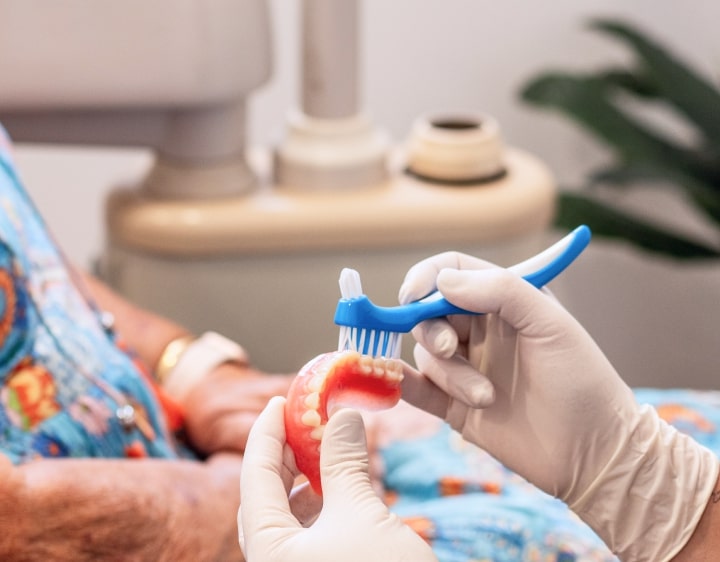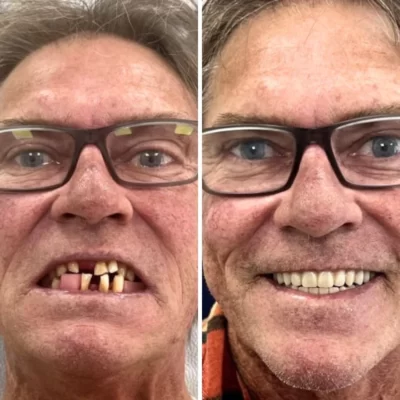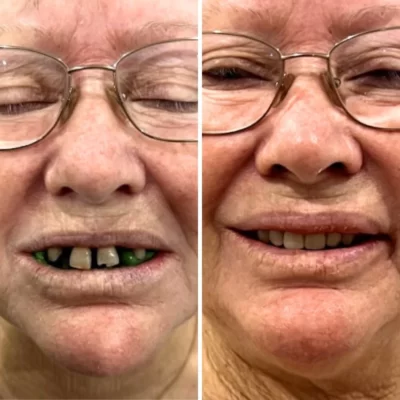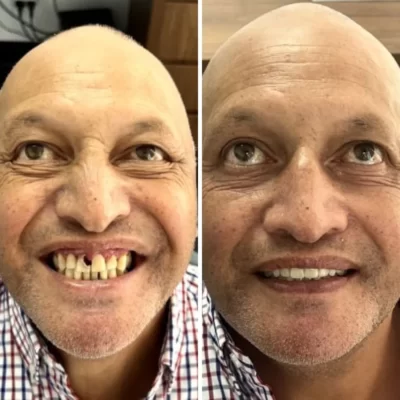The Gold Coast’s Best Denture Clinic For 20 Years
Comfortable, durable dentures that look just like your natural teeth.
Missing a few teeth? Gaps in your smile don’t just make eating and speaking more difficult—they can affect your self-esteem. We understand, and we’re here to help.
At South Coast Denture Clinic, we create affordable, high-quality custom dentures and flexible dentures that allow you to smile with confidence and enjoy your favourite foods without worry.
We’ve been transforming smiles with expert dental prosthetics on the Gold Coast for over 20 years. Whether you’re considering a new denture or replacing an existing denture, we can help you find the right denture solution. Book a free consultation today and discover what’s possible.
Smile Transformations


With affordable fees, flexible payment plans and early access to your Super, we remove the financial stress around getting dentures.
Why Gold Coast Locals Love Our Clinic

Value For Money
Get high quality, long-lasting removable dentures at an affordable price, without compromising on quality. All of our dentures also come with a 3-year warranty for total peace of mind.

Denture Experts
We are not a general dental clinic, we specialise exclusively in dentures, meaning we have mastered the art of creating comfortable, durable, and personalised dentures tailored to your denture needs.

On Site Lab
Dentures are designed and crafted in-house. We have a fully equipped dental laboratory to undertake all facets of construction on-site, allowing us to deliver custom dentures faster and with complete quality control.
Ready to smile with confidence? Contact us today.
Gold Coast Dentures FAQ
Our Gold Coast dentures clinic is located at 1/413 Golden Four Drive, Tugun, QLD 4224
Dentures can be made from various materials, each selected for its specific properties and suitability for different types of dentures and dental treatment:
- Acrylic Resin/Acrylic Dentures: This is the most common material used for the conventional denture base—the part of the denture that mimics the gums. Acrylic is chosen for its ease of adjustment and adaptability. It’s used for both complete and partial removable dentures.
- Metal Alloys: Cobalt-chrome alloy is a popular choice for partial denture frameworks because it is strong yet lightweight. It provides excellent support and durability without the bulkiness of other metals, making it ideal for metal dentures.
- Valplast and Other Nylon Polymers: Valplast is a flexible denture material used primarily for partial dentures. It offers a comfortable fit and a more natural appearance due to its translucency and flexibility, which allows it to blend in with the natural gum colour. This is a popular option for those seeking a personalised denture experience.
- Porcelain: Porcelain used to be a common material for denture teeth due to its natural appearance and hardness. However, it can be brittle and cause wear on existing teeth, so it’s less commonly used today in favour of more durable and adaptable dental prosthetics.
Each material has its benefits and drawbacks, and the choice of material typically depends on the patient’s specific denture needs, oral condition, and desired functionality and aesthetics. Our dental professionals can guide you in selecting the right option for your unique situation.
Absolutely, modern dentures are designed to look and feel much like natural teeth, incorporating several advanced technologies to enhance their fit, function, and aesthetic appeal:
Realistic Appearance: Dentures today are crafted using high-quality materials like acrylic resins and ceramics that mimic the look of natural teeth and gums. These materials can be colour-matched precisely to blend with any existing teeth and the natural colour of your gums, ensuring that the dentures look as natural as possible. For patients considering aesthetic enhancements, options such as dental veeners or dental crowns may also be discussed as part of a broader cosmetic dentistry plan.
Advanced Fabrication Techniques: The use of digital imaging and 3D printing technology in denture fabrication significantly enhances the accuracy of fit. These technologies allow for detailed custom denture creation based on the unique contours of an individual’s mouth, which not only improves comfort but also reduces the adjustment period often associated with conventional dentures.
Improved Comfort and Functionality: Modern dentures are more comfortable to wear thanks to their tailored fit. They are less likely to slip or cause discomfort, thus improving the wearer’s confidence in everyday activities like eating and speaking. For those with some missing teeth, removable dentures or flexible denture options are designed to integrate seamlessly with your remaining teeth, providing support and preserving alignment within the mouth.
Implant Supported Dentures: For an even closer resemblance to natural teeth in both appearance and functionality, dental implants are available. These are anchored directly into the jawbone, offering the foundation for either an implant retained denture or a full implant denture. This setup helps distribute biting forces more naturally and supports long-term restorative dentistry outcomes.
Choosing between dental implants and dentures depends on several factors including your dental health, budget, and personal preferences. Here’s a breakdown of both options to help you decide:
Dental Implants
Ideal for Missing Tooth: Dental implants are an excellent solution for replacing a missing tooth or multiple teeth. They are surgically placed into the jawbone, offering a permanent, stable base for artificial teeth.
Durability and Stability: Implants are surgically inserted into the bone, creating a reliable structure for an implant retained denture or full implant denture. They are highly stable and can last a lifetime with proper care.
Bone Health: Implants help preserve the jawbone and prevent bone loss, maintaining the natural structure of the face and improving long-term restorative dentistry outcomes.
Aesthetics and Functionality: Implants look and function like natural teeth, making everyday activities like speaking and eating more comfortable. They can be combined with dental crowns or bridges depending on the situation.
Cost and Procedure: While more costly and requiring sufficient bone density, implants are often considered a worthwhile investment in long-term dental care.
Dentures
Cost-Effective: Dentures are less expensive than implants and offer a budget-friendly dental treatment option for multiple missing teeth.
Non-Invasive: Getting dentures is a non-surgical process, making them ideal for patients who may not be suitable for implant surgery due to medical or anatomical factors.
Ease of Maintenance: Dentures, especially removable dentures, can be taken out for cleaning and maintenance.
Adjustment Period: Dentures may require some time to get used to. Depending on your needs, we can also offer an immediate denture after tooth extraction, so you don’t go without teeth during healing.
Considerations
Health Requirements: Implants require healthy gums and adequate bone, while dentures can be fitted even if there’s bone loss or pre-existing issues.
Longevity: Implants can last decades with proper care. Dentures usually last 5 to 8 years before needing replacement.
Immediate Needs: If time is a factor, dentures can be provided faster than implants. In urgent cases, we can assist with dental emergency options tailored to your situation.
Ultimately, a discussion with a qualified dental professional will help determine the most suitable path forward for your health, comfort, and lifestyle.
Taking care of your new dentures, whether they are upper dentures, lower dentures, or both, involves a set of practices that help maintain their condition and your oral health. Here are some essential tips for caring for your dentures:
- Daily Cleaning: Just like natural teeth, dentures must be cleaned daily to remove food particles and plaque, and to prevent stains. Use a soft-bristled brush and a non-abrasive denture cleaner. Avoid using regular toothpaste as it can be too harsh for the denture material.
- Handle with Care: Dentures are delicate and can break if dropped. When handling your dentures, do so over a folded towel or a basin of water to mitigate the risk of damage if you accidentally drop them.
- Soak Overnight: Most types of dentures need to remain moist to keep their shape. Place them in water or a mild denture-soaking solution overnight. Consult your dentist about the best soaking solution for your specific dentures.
- Rinse After Eating: Remove and rinse your dentures after eating to wash away food debris and other loose particles.
- Denture Repair: Do not attempt to repair broken dentures or adjust them yourself. Doing so can damage them irreversibly. If your dentures break, crack, chip, or feel loose, see your dentist immediately.
- Regular Check-Ups: Visit your dentist regularly to ensure your dentures fit properly and to check for any issues that might require adjustments. This is crucial because the shape of your mouth can change over time, which may affect the fit of the dentures.
- Oral Hygiene: Even if you have full dentures, it is important to maintain good oral hygiene. Brush your gums, tongue, and roof of your mouth every morning with a soft-bristled brush before you insert your dentures. This stimulates circulation in your tissues and helps remove plaque.
By following these care tips, you can help extend the life of your dentures and enjoy a comfortable fit. Regular visits to your dentist are also vital for professional cleaning and to ensure your dentures are in good condition and fit well.
Since there are many variables that can affect the cost of full dentures, we offer a free consultation and quote to assess your individual denture needs. As a general guide, full conventional dentures start from $2,500.
If you have private health insurance, we can provide you with the correct item numbers so you’re aware of any out-of-pocket expenses before your dental treatment begins.
We also offer flexible payment plans and early access to your Super to make your personalised denture or custom denture more accessible.
Whether you’re transitioning from an immediate denture or replacing an existing denture, our team is here to help you find the right solution for your comfort, function, and budget.
At South Coast Denture Clinic, we have been proudly serving the Gold Coast with dentures for years, offering comprehensive and personalised denture care to each patient.
Our expert dental professionals manage every aspect of your denture treatment, ensuring tailored services and high-quality dental prosthetics, including both upper and lower removable dentures.
Our on-site dental laboratory produces top-notch custom dentures, using the latest advancements in dentistry and fabrication equipment. We also work with patients requiring support after tooth extraction, offering solutions like immediate dentures to restore function and appearance quickly.
Staying current with modern practices in general dentistry and cosmetic dentistry, we provide additional options such as teeth whitening and dental veeners, depending on your preferences. Our commitment to comfort, quality, and satisfaction has made us a leading choice for restorative dentistry on the Gold Coast.
Whether you’re replacing an existing denture or exploring advanced options like an implant retained denture, our team goes the extra mile to ensure long-term comfort and results. We’re here to support you in every step of your dental care journey.







